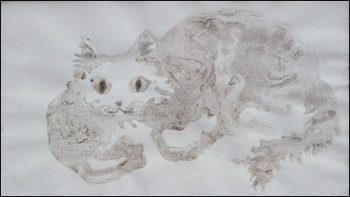

[Furry Cat, 1960's], w.c.
Detachment
I
I think that C. was capable of a good deal of mental detachment. I think that she was usually highly conscious of what was going on in any situation, even though she didn’t verbalize this, at least not at the time.
When I read her a passage in one of our friend Tom Roberts’ letter in which he talked about working on mathematical puzzles in his head while in the dentist’s chair (something utterly beyond my own abilities), she said something to the effect that she could similarly preoccupy herself and shut out pain.
This ability to hold mental structures in her mind was no doubt related to her ability in her later years to have a complicated image in her mind before she set pencil to paper or brush to canvas. She rarely did preliminary sketches for a work, and I’m inclined to say that she didn’t often do preliminary pencillings on a canvas. However, there is a small canvas now on her studio wall in which the whole configuration has been laid out in pencil.
II
She played mind-games with people at times. She’d come back from a morning’s shopping with someone whose longstanding friendship mattered a lot to her and say, “I just couldn’t resist saying such-and-such,” knowing that it was politically incorrect in terms of the friend’s American-style liberalism and that she’d get a mini-lecture setting her straight. She reported with amusement how she told the artistically swinging young President of the Nova Scotia College of Art and Design whose gaze was firmly fixed on what was happening south of the border, “Oh, Garry, you’re just a Canadian” (which he was).
She psyched me out on numerous occasions, and would finally say, after I’d become suitably irritated or indignant, “Oh, you’re so easy to tease.” She spoke with amusement on one occasion of the woebegone look of an old friend when she refused to let her order a too-rich dessert. She was very fond of her, and admired her, but she could still see the humour in particular situations.
III
I very rarely surprised her with any insights into her own behaviour. I did on one occasion when she was expressing anger about what she felt was an undue deference towards the demands of prisoners currently rioting in some penitentiary.
I had probably triggered things by saying that one really needed to understand what was bothering them. When she got annoyed, I said—and it simply came to me then—something like, “You get annoyed when people are always asking you to make allowances for criminals, but are unwilling to make allowances for you.”
Which they were. Her sharp-tongued remarks at times were usually taken as signs of her bad nature, rather than as justifiable responses to situations, or the results of intolerable pressures on her. Because she could be so wise, and sane, and humane, she was expected to be wise, and sane, and humane all the time.
She half laughed when I said what I did, and immediately agreed. I think it surprised her a bit that I could spot a connection that she hadn’t—surprised and perhaps pleased her.
IV
A friend who saw her a day or two before she died said that C. told her, slowly, “It’s---very---interesting,” meaning the dying.

